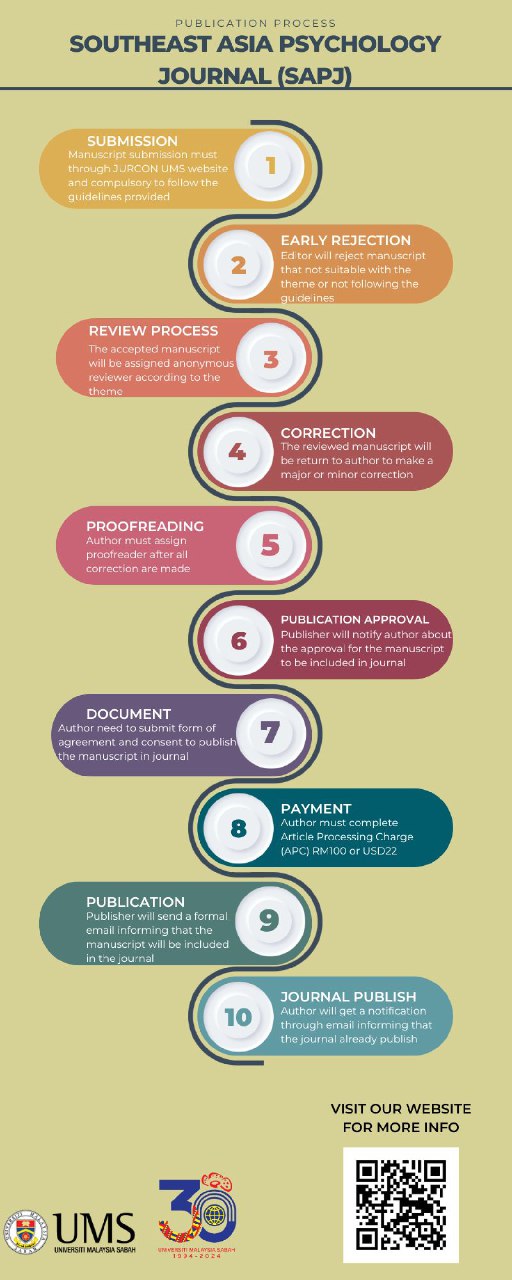THE EFFECTS OF SPIRITUAL INTELLIGENCE ON ACADEMIC ACHIEVEMENT AND PSYCHOLOGICAL WELL-BEING OF YOUTHS IN KANIBUNGAN VILLAGE, PITAS
DOI:
https://doi.org/10.51200/sapj.v7i3.5237Keywords:
Spiritual Intelligence, Academic Performance, Psychological Well-BeingAbstract
Youths today deal with many challenges, such as gaining better academic success and maintaining psychological well-being. In dealing with these challenges, one of the factors that might predict youths’ academic success and psychological well-being is spiritual intelligence. Therefore, a study was conducted to examine the effects of spiritual intelligence on youths’ academic achievements and psychological well-being. Two hundred fifty youths from the Emmanuel Christian Fellowship group of Kanibungan village, Pitas took part in this study. A set of questionnaires, which consisted of four sections, were used to measures the youths’ demographic profiles, academic achievements, spiritual intelligence, and psychological well-being. The research hypotheses were analysed using the simple regression test. Results showed that spiritual intelligence can stand as a predictor for both academic achievements and psychological well-being. Spiritual intelligence can be explained for 40% of the variance on academic achievement (β=.64, F(1, 248) = 169.677, p < .05). In addition, spiritual intelligence explained 25% of the psychological well-being (β=.50 F(1, 248) = 84.656, k < .05). The results revealed that the higher a youth’s spiritual intelligence, such as when applying spiritual values when dealing with problems and adapting to new environments, the higher a student’s academic achievements and psychological well-being. The findings allow us to reflect on how, aside from the intelligence quotient, spiritual intelligence is important for youths’ academic success and psychological well-being. Instilling spiritual intelligence in youths may give them strength and faith when meeting the challenges of today’s world.
References
Charkabi, M., Mortazavi, A., Alimohammadi, S., & Hayati, D. (2014). The Effect of Spiritual Intelligence Training on the Indicators of Mental Health in Iranian Students: An Experimental Study. Procedia - Social and Behavioral Sciences 159, 355–358.doi: 10.1016/j.sbspro.2014.12.387 WCPCG 2014
Dollard J. (1983). Toward spirituality. Hazelden, Minnesota.
Dougherty, T. J. (2011). The relationship between spirituality, spiritual intelligence and leadership practices in student leaders in the Brigham Young University-Idaho student activities program (Unpublished doctoral dissertation). College of Education, Idaho State University, ID, USA (14) (PDF) Religious orientation and its relationship with spiritual intelligence. Available from: [accessed Sep 19 2019]. https://www.researchgate.net/publication/308577293_Religious_ orientation_and_its_relationship_with_spiritual_intelligence
Emmons, R. A. (2000). Is Spirituality an Intelligence? Motivation, Cognition, and the Psychology of Ultimate Concern, The International Journal for the Psychology of Religion, 10:1, 326, doi: 10.1207/S15327582IJPR1001_2
Filia, R. (2010). Pengaruh kecerdasan emosional, kecerdasan spiritual, dan perilaku belajar terhadap tingkat pemahaman akuntansi.
(Studi empiris pada mahasiswa akuntansi Universitas Diponegoro Semarang dan Universitas Gajah Mada Yogyakarta). Semarang: UniversitasDiponegoro.
Gay, L., R. (1992). Education research competencies for analysis and application. London: Charles E. Milton Keynes Philadelphia
Company.
George, D., &Mallery, P. (2010). SPSS for windows step by step: A simple guide and reference 17.0 update (10th Ed.). Boston: Pearson.
Hamjah, S., H., Rozali, E., A., Rasit, R., M. & Ismail, Z. (2012). Perkaitanamalan spiritual dengan pencapaian aademik pelajar. Asean Journal of Teaching and Learning in Higher Education, 4(2), 51-60.








